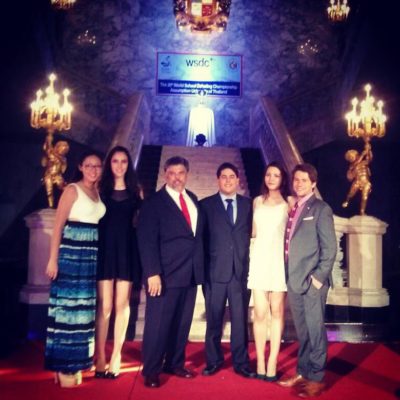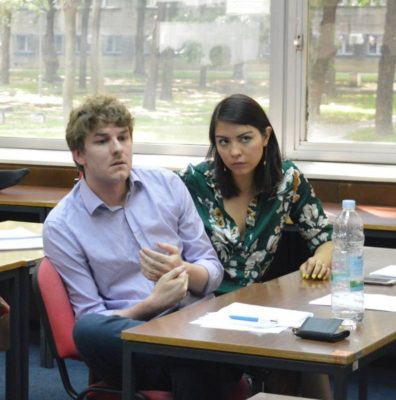“I’ll keep debating” – an interview with Lucía Arce Cubas
Today’s feature presents: The first speaker to be top of the tab at an EUDC in both categories as an ESL participant since 2001, Lucía Arce Cubas! In the interview Lucía told us about her origins, debating career and being ESL in the UK.
Achte Minute: Hello Lucía! Thank you for taking the time, we’re very glad you are here!
AM: Assuming some of our readers haven’t heard of you before the EUDC: Could you tell as more about yourself? Who are you? Where do you live? What are you studying?
Lucía: Sure! So my name is Lucía Arce Cubas. I have two last names, because in Mexico we have both of our parents’ last names. I’m currently studying Biochemistry and Microbiology at Sheffield University. As my last names already gave away, I am Mexican and have spent most of my life in Mexico, but I moved for the UK for my studies. And for Euros in Novi Sad I was one half of Sheffield 1, alongside top bae Daniel Klein, and we did pretty well! We broke third, Dan was 7th best speaker and I was 1st best speaker in both ESL and open tab.

Team Mexico at the WSDC in Thailand 2014 – © private
AM: Can you tell us about your debating career? Where did it start?
Lucía: It started when I was in high school, so I’m one of those infamous schoolies. I debated in high school, WSDC format. I was also in team Mexico, which was very helpful, because although in Mexico we don’t really have as much of a circuit as the UK or the Netherlands does, I had the advantage of getting a coach and having had lots of practice. When I moved to the UK I began doing BP debating. I had never done it before, but it was ok. I wasn’t amazing on my first year! Just kind of knew what I was doing. In the second year I got better. I was 8th best ESL speaker, but we didn’t break. We did pretty well this year though – I think it is a good story of how if you work hard you can improve, because neither me nor Dan was immediately incredible, we rather had to practice lots and it took time for us to get better.
AM: So, you just achieved becoming best speaker at the EUDC as an ESL participant. How do you feel?
Lucía: On one hand, it’s amazing! But on the other, it feels super surreal. It’s amazing because when I started debating in high school, it was incredible when someone was able to beat the native speakers, it rarely happened – it was like slaying a dragon. I think that also was the case when I started in university, but things have changed. For example, I found it really inspiring how last year at Tallinn, Tel Aviv (Noam Dahan and Tom Manor) made it to both ESL and Open finals, and how now the best speakers at WSDC, WUDC, and EUDC are all ESL! And that’s amazing, because those things really signify progress. Obviously there is still a lot of ESL bias, I think it is probably less noticeable at the top once you have a rep, and middle and bottom rooms still aren’t faring great, but progress is happening. It’s really amazing to be part of it – I used to look up to best speakers and be like ‘wow, they are so good!’ and now… I somehow got it? What?
It’s also really cool more women (and women of colour!) are getting recognized – from last years’ joint best speaker Bethany Garry, and also both years having 3 out of 10 women in the top ten. When I started speaking the paragon of good debating was white and male, and I think having other role models matters.
AM: What’s it like to be an ESL debater in the UK?

The Sheffield Debating Society at their Christmas meal – © private
Lucía: Well, so I think that in some ways it’s easier but in others it’s probably harder. It’s hard to find another ESL person at your institution, for example to go to Euros. There is also, unlike in ESL household institutions in other countries, a lack of institutional knowledge on handy tips to skirt ESL bias. For instance, I found working on my clarity and structure really helpful to avoid the dreaded ‘it just wasn’t that clear’ piece of feedback after rounds, so no one can misunderstand you. So those kind of tips were hard to come around. It’s also a bit tough because you are always debating against EPL people who just sound better so it can be a bit disheartening. However, I am also aware I am really privileged and it was very helpful to have so much debate practice in English. Besides, IONA is a very active circuit, with tournaments every weekend, and the upside of speaking in a mostly EPL circuit is that you get used to people speaking really fast, and can steal some of that fancy native rhetoric.
AM: In your first facebook post after the tab announcement you said you were a queer person. Would you like to talk about you being queer as a debater and the obstacles the post hinted at?
Lucía: Well, I identify as bisexual and to be completely honest I don’t think I’ve been hindered a lot by that, at least within debating! To be honest I think it was the other way around. I present as very femme and ‘pass as straight’, but also I think debating overall is a very liberal environment. I came from a really Catholic country that isn’t quite as liberal, where things like LGBT+ marriage were hardly discussed or taboo, and the word “feminist” was not associated with good things. I think coming into the debate circuit massively broadened my view, to read more on certain topics, meet other queer individuals, and just be in a much more liberal environment, massively changed my views and also made me accept myself a lot more. This also applies to basically everything – politics, ideas about the world, feminism, racism, LGBT+, debate was just so helpful. Obviously this experience might differ for other people from the LGBT+ community, but for me debating was welcoming, and a life saver.

Matt Hazel and Lucía Arce Cubas at the Belgrade Open 2018 – © Debatni klub Pravnog fakulteta
AM: Having achieved almost everything one could in debating, what plans do you have for the future?
Lucía: Well, I don’t think I have achieved that much, really. In terms of things I’d like to achieve, I’d like to go to worlds. The problem is, it’s obviously in Cape Town, it’s really far away and we don’t know if the society can afford it. But that would be cool. I also think we are better than a euros quarter! I’d also like to judge more at internationals, I judged Mexico and had fun. I also did apply to DCA Athens (though obviously didn’t get it, some overwhelmingly qualified people did) so… who knows. Basically there are lots of things I still would like to do! I know it’s rather hard to achieve, but, y’know, if the Universe is kind and I get lucky and work hard. I also just really enjoy debating. I wouldn’t say that in my relationship to debating I’m only goal-driven, I simply enjoy it. It’s fun. I find it a very stimulating intellectual exercise, the debates themselves, the competitive aspect of it… It has also given me some of my best friends. So I’ll keep debating, I’m not retired!

Lucía Arce Cubas and Rachel O’Nunain – © private
AM: What’s the best advice you could give debaters in general and those dedicated to, let’s say, breaking at the EUDC?
Lucía: Hm. Okay! So I think that in terms of general advice I’d say: Have fun. It’s a really fun activity. I think it’s legitimate that people are competitive but you should also enjoy it.
For dedicated debaters, three things:
- Practice makes perfect. Practice all you can, especially with your EUDC team partner. Do practice debates, go to tournaments. Perfecting your dynamic and chemistry is important. Dan and I were doing really well at euros, I thought, because we had a really good dynamic going that we had perfected across tournaments for our prep, he said one thing and I immediately got what was up, strategizing… So go to tournaments, get lots of feedback from experienced judges, practice against other strong teams.
- Don’t be bitter, be better! All the practice and feedback in the world is useless unless you’re willing to take the criticism on board. You need to be really self-critical about the things you are bad at. Nail the basics – ideally if you’re at the stage of trying to break at euros you have those down to a pat, but always good to remember them – but also be very focused. I think it is easier to improve on one thing at a time rather than try and do seven. For example, before euros, I thought I was pretty decent at rhetoric and sort of picking the important arguments of what the debate should be about, but I was rather poor on the micro analysis about why exactly that analysis was true. So I watched how other speakers did it (my friend Rachel O’Nunain is fabulous at it), and was very aware of it every speech I gave until I became better at it, and could move on to improving something else.
- The last thing, which was very helpful for me, was speaking with different partners. Not necessarily people who are super experienced and world class debaters, but people on your level, so you try different things and learn from different people. I stole my prep time management from Camilo Ruíz; my microanalysis from Rachel, who as I mentioned before is amazing at giving seven different reasons why an obvious thing is true; lots of my strategic nuances and ways of thinking about debates come from Matt Hankin; my moral outrage style is all Emma Lucas. These are just the first examples that I thought about off the top of my head, but lots of other people have also helped and influenced me!
AM: Is there anything else you’d like to tell our readers?
Lucía: I think that it’s important so sort of put the achievement in context. Euros is very much a game of not just how good you are, but also of what judges you get, what motions and positions you get… so for example I was incredibly lucky – thank you, CA team – that on day 3 the first motions was about Latin America and drugs, the motion I had been waiting for my whole debating career. It’s skill, but also luck, another set of motions and someone else might have topped tab!
AM: Thank you very much!
The interview was conducted by Lennart Lokstein.
lok.
Mittwochs-Feature: Every Wednesday the Mittwochs-Feature features an idea, interview or book regarding debate – usually in German, sometimes in English, sometimes both. If you would like to do a feature regarding a certain topic please mail us your idea to team [at] achteminute [dot] de.






